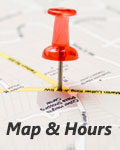Call (928) 445-2440
When Should a Denture Be Replaced?
There is no specifically agreed-upon chronological answer by dentists to "When should a denture be replaced?" There are instances where dentures have been replaced after 1 year or less, and on the opposite side of the spectrum, there are people who have worn the same dentures for 25 or more years. These ranges obviously are extremes.
However, on average, dentists seem to be replacing dentures somewhere between four to eight years. This would seem to imply that the average denture fabricated from contemporary biomaterials will wear out and deteriorate within that time and/or the average denture patient's jaws have changed so much that a new denture must be redone.
Each individual's denture needs are different. There are some factors that a licensed dentist takes into consideration when evaluating the need to replace dentures.
Denture Longevity Considerations
Lost vertical dimension:
The proper linear distance relationship between the upper and lower jaws is called vertical dimension. This is unique for each individual.
As one's jaw changes and the ridges upon which dentures rest shrink, a denture becomes loose and vertical dimension begins to change (the vertical dimension is said to be lost by a certain linear measurement unit such as millimeters). Additional plastic (acrylic resin) is added to the inside of a loosening denture (called relining a denture) to stabilize it by reducing looseness caused from jaw shrinkage. However, relining does not restore vertical dimension in an accurate way.
The current position held by most dentists is that when vertical dimension has been lost by three millimeters or more, a new denture should be fabricated in order to restore vertical dimension and maintain functional health.
There are individuals who have worn the same denture for extended periods with considerable loss of vertical dimension over time. Since vertical dimension loss is a slow, but nevertheless progressive, process, they have gradually adapted to a continually increasing closed bite position. These individuals often have a sunken facial appearance and usually appear much older than their chronological age.
Functioning with an abnormal vertical dimension may eventually result in alterations of the temporomandibular joints (TMJ, the jaw joint located in front of the ears). This can lead to significant pain and difficulty with effective eating and even the jaw motions involved with speech. It frequently becomes quite difficult, if not impossible, to restore such individual's proper vertical dimension and chewing efficiency by relining and repairing this older denture.
Tooth wear:
Aside from impaired ability to chew effectively, excess tooth wear will adversely affect esthetics and cause other problems associated with lost vertical dimension, as described above. While porcelain denture teeth will wear at a slower rate than plastic teeth, they nevertheless will wear and are more susceptible to chipping and cracking. Multiple cracked teeth will need to be replaced.
Deterioration: While the biomaterials used by dentists to fabricate dentures today are quite durable, they still deteriorate and exhibit dimensional change over time -- no longer fitting properly, even after relining.
Aging plastic looses its natural appearance and texture, and coloration fades, making dentures look quite artificial.
Deteriorating plastic also makes it easier for dentures to become excessively contaminated with microorganisms. This contributes to mouth irritation and bad taste, and socially unacceptable odors will develop that no amount of denture cleaning will seem to eliminate.
Keeping regular dental check-ups with your dentist so that one's dentures, soft tissues, and jawbone may be checked is essential to extending the life of a denture and maintaining oral health.
by Joseph J. Massad, D.D.S.
Call for an appointment:
(928) 445-2440
Make an Appointment
Free Exam & X-rays
Take this opportunity to safeguard your smile today. **Offer valid for new patients without dental insurance.
Implant Special Now Only $1,199
Limited Time Offer *(Does not include CT Scan or Restoration)





